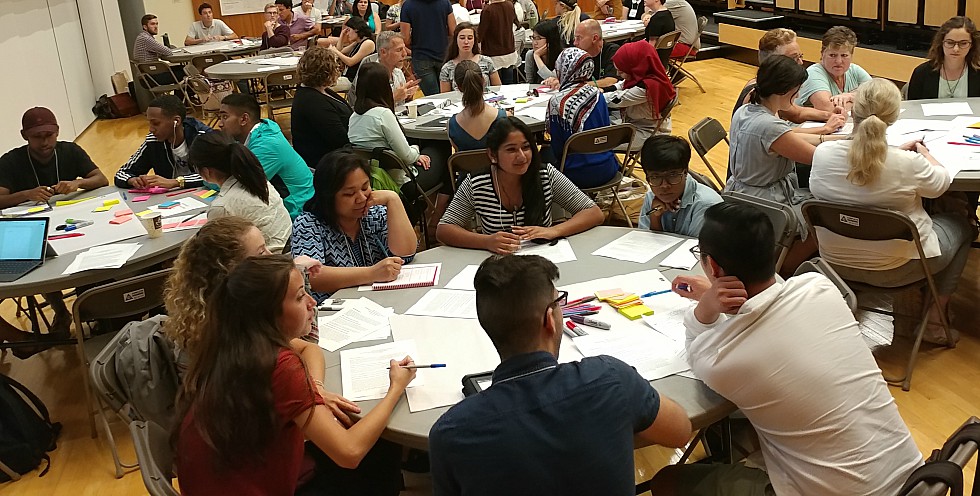Change Camp brings campus, community together on projects to enhance Hamilton

180 students, faculty, residents, and community members, gathered recently for Change Camp Hamilton, an event aimed at finding ways to take action on neighbourhood projects identified by the Hamilton community.
How can McMaster work together with the Hamilton community to combat food insecurity? What can be done to make Hamilton streets and neighbourhoods safer? How can we ensure that people have access to affordable housing?
These questions and more were discussed at Change Camp Hamilton, an annual event held recently at McMaster’s David Braley Health Sciences Centre, which brought together the McMaster and Hamilton communities to take action on key projects identified by the Hamilton community.
180 students, faculty, residents, and representatives from the City of Hamilton, post-secondary institutions and community organizations, gathered to take part in workshops aimed at finding ways to contribute to, and move forward on, a range of existing neighbourhood projects.
“In past years, we’ve had great conversations and generated a lot of ideas at Change Camp, but this year, we really wanted to focus on moving community projects forward,” explains Christine Yachouh, project assistant with McMaster’s Office of Community Engagement, who co-organized the event with Stephanie Bertolo, associate vice-president, municipal affairs at the McMaster Student Union (MSU).
Projects were identified in advance by members of the Hamilton community and included initiatives related to food insecurity, safe streets and communities, and affordable housing. Projects also included a proposal to use retired shipping containers to create affordable spaces for low-income individuals to launch small businesses, and a project to start a community print shop to provide a shared space to publish community newspapers.
“What we wanted to achieve with Change Camp was to bring people together in the same room to share their knowledge and experiences, and also connect them with the project leaders so they can participate in these projects and help move them forward in whatever capacity they want to in the future,” says Yachouh.
Catalyst grants will be available to help support these projects going forward. Project leaders are eligible to apply for the funds, which will be provided in partnership through McMaster, the Hamilton Community Foundation and the City of Hamilton’s Neighbourhood Action Strategy. The grants can be used support a range of needs including prototyping, research, or efforts to secure other sources of funding.
Change Camp was organized by McMaster’s Office of Community Engagement and the MSU, in partnership with the Hamilton Community Foundation’s Neighbourhood Leadership Institute, Redeemer University College, Mohawk College, the Social Planning and Research Council of Hamilton, the City of Hamilton and Evergreen.
Last year’s Change Camp Hamilton event resulted in more than 200 action recommendations, many of which have since been developed into tangible projects to enhance the Hamilton community. Read the Change Camp 2016 Recommendations Report for more information.
If you are interested in learning more about any of the actions or projects described in the Change Camp 2016 report, or from the 2017 Change Camp event, please email community@mcmaster.ca.


